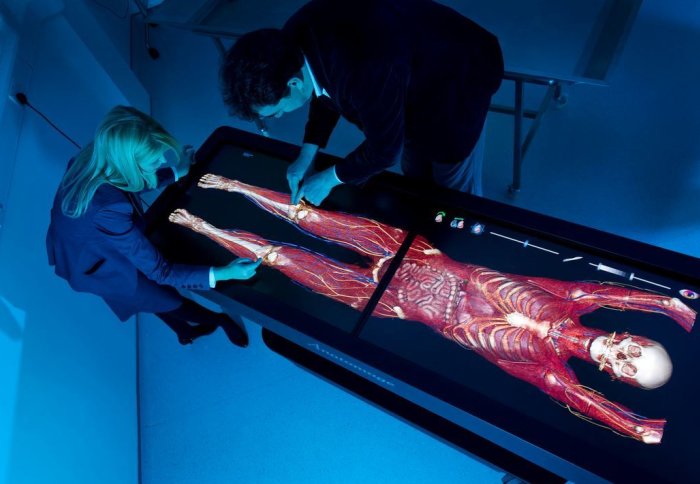Transforming a curriculum: Learning from Bristol Medical School

Innovations such as the Anatomage Table are at the cutting edge of medical education at the College
The Faculty of Medicine is transforming its curriculum, in line with other universities. Bristol Medical School visited the College to share learnings
Professor Henderson leads the curriculum review of Bristol's MB ChB, a popular course that underwent radical reform for its 2017/18 student intake. In a lecture at the College on 10 October he shared his expertise on creating a new curriculum that fully prepares students for the world of medicine.
Dr Joanne Harris, Chair of the MBBS Curriculum Review & Deputy Head of Undergraduate Medicine at the College, said: “Bristol have undergone a similar curriculum change to ours, integrating science and clinical teaching, as well as making a concerted effort to involve the community in more clinical teaching.
“The purpose of Professor Henderson’s visit was to share some of the information needed not only for change in a medical curriculum, but also improvements across the board within education at Imperial.”
In 2014, the University of Bristol recognised that medical knowledge was changing rapidly. The role of a doctor was evolving, and population demographic changes were bringing about major challenges for the profession make way for these priorities. Therefore, following a review of the extant curriculum, a decision was taken to conduct a wholesale review of the content and teaching methods.
After his lecture at Imperial Professor Henderson sat down with Murray MacKay and answered some questions about his experience of transforming education at a prominent medical institution.
What is your background? Do you think this has influenced your approach to curriculum review?
I am a paediatrician and practised for over 30 years in both general and specialty paediatrics. I have witnessed enormous changes in medical knowledge and understanding in my career. I am also cognizant of the impacts of technology in both practice and learning of medicine. The volume and pace of changes that I have experienced have influenced my thinking about the tools that newly graduating doctors need to have at their disposal to thrive in the next few decades of medical practice.
When you were tasked with transforming education at Bristol Medical School what was the state of learning and teaching, and the wider degree programme, at that time?
Bristol had a successful medical programme by all available metrics. Applicants per place were high, graduates performed well in their Foundation Programmes and had a high success rate in postgraduate examinations and in appointment to their chosen specialty training programme. However, the curriculum had become crowded, poorly signposted and left little time for personal development. Although our students appeared to be well prepared for professional practice, they reported not to be confident as they entered the workplace. They also felt ill-prepared for a lifetime of adult learning due to the high proportion of didactic teaching they received. There was also a very high summative assessment load, which promoted a competitive culture.
There must have been significant challenges and opportunities in transforming the School on such a scale. Do you consider the job done, or is there more that you would like to do?
It is very much a work in progress. We were given a challenging timescale to review the curriculum (2 years) and consequently, we are constantly working against the clock. I have always been sanguine about the fact that things would not be perfect straight away as many of the changes were such a departure from previous practice. Therefore, there is an explicit understanding that the process will be iterative with continuous review and revision. I restructured the curriculum governance to ensure that the process was fit for this purpose. Bristol had not had a comprehensive curriculum review for over 20 years prior to this one; this timescale is not compatible with a curriculum that is responsive to changing health care needs and medical advances.
You’re at Imperial today to share your experiences, do you think there are any similarities between Bristol and the College?
Both institutions have long and distinguished histories of educating doctors so have established cultures and processes that may present barriers to change. We also attract a broadly similar demographic of students; academically able, ambitious, wishing to be challenged intellectually and usually interested in extending their knowledge and expertise through engagement in research. Both institutions are research-intensive and the challenge is to make sure that students have sufficient time to explore their interests beyond the core curriculum whilst ensuring that all graduates achieve the core knowledge, skills and attributes that equip them for their future professional careers.
Imperial staff are reviewing the curriculum and considering radical new approaches across all faculties. Was there a moment at Bristol which you personally considered to be a tipping point in successfully delivering a new approach?
I think this really came with the mandate from the Vice Chancellor to initiate the process of curriculum review. Therefore, the change was supported by the highest echelons of the University and Medical School senior management teams. This made it easier to persuade the doubters and of course there were many sceptics. The moment for me came when I watched a room full of academics from diverse disciplines (biomedical sciences, clinical medicine, humanities, psychology, etc.) discussing the learning outcomes for a series of cases. The energy in the room and the collective wish to improve the learning experience for the students while adhering to the highest standards of scholarship was an endorsement of the vision that I set out with; to ensure that every learning opportunity had direct relevance to the students’ future work as doctors.
Article text (excluding photos or graphics) © Imperial College London.
Photos and graphics subject to third party copyright used with permission or © Imperial College London.
Reporter
Murray MacKay
Communications Division